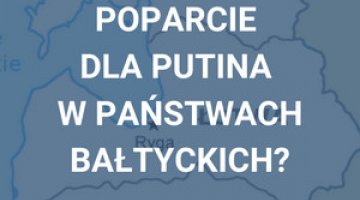The failure of Lithuanian-Polish negotiations aimed at modifying the Education Act
The three-month work of the Polish-Lithuanian commission of education experts, which was formed in September upon the initiative of the prime ministers of Poland and Lithuania, ended in failure. The commission was established under pressure from protests and a strike by young ethnic Poles in the Vilnius region against the recent amendment of the education law. These amendments have significantly limited the rights of national minorities to be educated in their native languages (history, geography and social studies lessons are to be taught only in Lithuanian; those Polish schools where the number of pupils is insufficient will be closed and pupils will be transferred to schools with Lithuanian as the language of instruction). The law will also reduce education opportunities for young Polish people in comparison to their Lithuanian peers (for example, Polish pupils took the examination in Lithuanian upon secondary school graduation at an easier level, and now this examination will be at the same level as in the case of schools with Lithuanian as the language of instruction). Poles are the largest national minority in Lithuania (7%). They form a condensed population mainly in the Vilnius region (the south-eastern part of the country, including the capital city), where they form either a significant or predominant part of the residents.
The commission’s meetings have failed to bring the stances of the two parties closer together. The parties were unable to agree on the key issues regarding the changes in the education system. In effect, the tension between the Polish minority and the Lithuanian government has not lessened. This raised concerns for Knut Vollebæk, the OSCE High Commissioner on National Minorities, who visited Poland and Lithuania and recommended the two parties take action to prevent the tension from turning into a conflict. He also reproached Lithuania for delaying the development of a new law on national minorities (the previous one expired in 2010). The Polish parliamentary Commission for Contacts with Poles Abroad deemed that Lithuania’s restriction of the opportunities for education in the native language of national minorities is contrary to the provisions of the Polish-Lithuanian Treaty signed in 1994 and of the Council of Europe’s Framework Convention for the Protection of National Minorities. The commission recommended the Polish government develop a programme to support the endangered Polish education in Lithuania.
-
A compromise on teaching in the languages of national minorities is impossible without amending part of the regulations of Lithuanian Education Act. The Lithuanian government has taken a hard-line approach on this issue. The Lithuanian prime minister, Andrius Kubilius, is sticking to his stance that the law will not be changed, and the Lithuanian Ministry of Education did not make a single concession in any of the issues vital to the Polish side. The only concessions proposed were those regarding the timeframe for implementing individual changes, i.e. those as part of executive acts of this law. Thus the meetings of the expert commission were simply used by the Lithuanian side to promote its point of view and to show that Vilnius is not avoiding a debate on disputable issues.
-
The Lithuanian prime minister made attempts to cover up the failure of the education talks with a proposal to create another joint commission to deal with the development of the Vilnius and Suwałki regions, and the Lithuanian minister of justice suggested a resumption of the debate on the spelling of non-Lithuanian names. The Lithuanian government is increasingly aware of the fact that Poland’s demands for Lithuania to fulfil its obligations under the Polish-Lithuanian Treaty are becoming a constant element of the Polish policy towards Lithuania, and it is impossible to build a broader platform for political co-operation between the two countries without showing good will in issues concerning national minority rights.
- As regards the rights of the Polish minority, including in particular education, Lithuania is unlikely to revise its stance in the immediate future, especially due to the fact that parliamentary elections have been scheduled for next year. The political right, which has been losing public support, will try to capitalise on the strengthening nationalist sentiments among the Lithuanian public and will be pointing to threats linked to the political mobilisation of the Polish minority. The conflict over education issues is however consolidating the national minority electorate in its support for the Electoral Action of Poles in Lithuania. This in turn is offering this party an opportunity to create its own faction in the Lithuanian parliament and thus have a greater influence on the politics of Lithuania and form a stronger opposition to the Lithuanian political right.





